Israeli Prime Minister Benjamin Netanyahu has declared that the war in Gaza is “not over” following the alleged killing of Hamas leader Yahya Sinwar, even as Western leaders expressed hope that his death would present an opportunity to end the yearlong conflict.
“Today, evil has suffered a heavy blow, but the task before us is not yet complete,” Netanyahu said in a record address on Thursday.
Netanyahu’s sentiments were echoed by other prominent Israeli politicians, including Benny Gantz, the leader of the centre-right National Unity party.
Gantz, who resigned from Netanyahu’s emergency war cabinet in June amid disagreements over the prime minister’s handling of the war, said the “mission is not over” and Israeli forces would operate in Gaza for “years to come”.
Israeli military chief Herzi Halevi said that while his forces had settled “the score” with Sinwar, his forces would keep fighting “until we capture all the terrorists involved in the October 7 massacre and bring all the hostages home”.
Israel’s military said it killed Sinwar, who is accused by Israeli authorities of masterminding Hamas’s October 7 attacks, in a firefight on Wednesday in Rafah in southern Gaza.
Hamas has not confirmed or commented on Sinwar’s alleged death.
The remarks by top Israeli leaders appeared to dampen expectations among Western leaders that Sinwar’s alleged demise would hasten the end of the war.
United States President Joe Biden, whose administration is Israel’s most important political backer and supplier of arms, said the Palestinian leader’s alleged death was an opportunity for a “day after in Gaza” and a political settlement that provides a “better future for Israelis and Palestinians alike”.
US Secretary of State Antony Blinken held separate phone calls with his counterparts in Saudi Arabia and Qatar about Sinwar’s alleged death and “efforts to end the conflict and secure the release of hostages,” the US State Department said.
Speaking on the campaign trail, US Vice President and Democratic candidate Kamala Harris said an opportunity had arrived to “finally end the war in Gaza.”
“And it must end such that Israel is secure, the hostages are released, the suffering in Gaza ends, and the Palestinian people can realize their right to dignity, security, freedom and self-determination,” Harris said on the sidelines of a campaign event in Wisconsin.
“And it is time for the day after to begin without Hamas in power.”
In Europe, French President Emmanuel Macron described Sinwar’s alleged death as a “turning point”.
“We must seize this opportunity to secure the release of all hostages and for an end to finally be brought to the war,” Macron told reporters following European Union summit talks in Brussels.
Italian Foreign Minister Antonio Tajani also expressed hope that the alleged demise of Hamas’s top leader would lead to a ceasefire.
While Netanyahu warned that the war was not over in his address, he also suggested that Sinwar’s alleged killing had brought the end of the conflict closer into view.
“While this is not the end of the war in Gaza, it is the beginning of the end,” he said.
“To the people of Gaza, I have a simple message: This war can end tomorrow,” he added.
“It can end if Hamas lays down its arms and returns our hostages.”
Daniel Levy, president of the US/Middle East Project and a former adviser in the Israeli government, said, however, that killing Sinwar would not end Palestinian resistance in Gaza.
“‘This is like Osama bin Laden – that’s what the American president said. You kill a terrorist and everything goes happy ever after. But this is a resistance movement rooted in its people because its people are oppressed and denied their rights,” Levy told Al Jazeera.
“This will continue and people will look at this and see someone, I imagine, who is a martyr who gives greater lustre to this cause of the Palestinians,” he added.
At least 42,409 people have been killed in Gaza since the start of the war, according to the enclave’s health ministry.
More than 1,130 people were killed in Hamas’s October 7 attacks, according to Israeli authorities.
Among the more than 250 people taken captive by Hamas on October 7, 101 are still missing, according to Israeli tallies, at least half of whom Israeli authorities believe are still alive.

